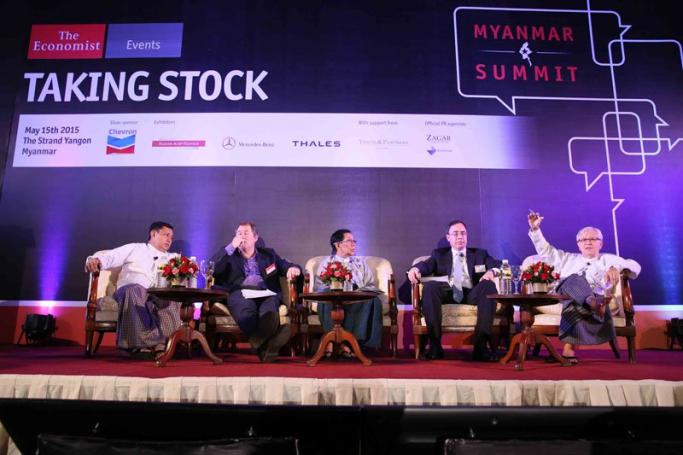Participants at an Economist Magazine conference in Yangon were bullish on Myanmar’s reform programme, even though the average man on the street might be more cynical.
Myanmar’s union minister of information and the President’s spokesperson, U Ye Htut, gave the opening keynote speech at The Economist Events’ Myanmar Summit on May 15, where he discussed the progress Myanmar has made with political and economic reforms and the country’s upcoming election later this year.
The inaugural Myanmar Summit held at The Strand in Yangon on May 15 brought together over 200 leaders from across Myanmar’s government and political parties, together with leaders from international business, institutions, and academia.
The event, titled “Taking Stock,” examined the progress Myanmar has made across politics, economics, business, and society since the beginning of the country’s transition to democracy in 2011. Attendees also discussed the outlook for the country as it heads to the polls later this year in November, looking at what results may spell for business and investors.
During his opening remarks, U Ye Htut discussed Myanmar’s recent reforms and what these new policies and laws aim to achieve, as well as some of the key challenges the country now faces.
“The 2008 constitution was designed to avoid the chaos of other nation's democratic transitions. The people of Myanmar are tired of conflict, deadlock and isolation. I assure you that Myanmar’s reform process will neither stall nor backslide. Most of the changes happened early on at the macro level. Implementation at the micro level is more challenging and will take time to realise, especially due to current capacity constraints. The future of Myanmar’s reform process will be based on how key stakeholders handle peace building and constitutional reform. The future of Myanmar’s reform process will be based on these two key issues,” said U Ye Htut.
Other high-level speakers in attendance included: Dr Maung Maung Thein, deputy minister, Ministry of Finance; Dr Aung Tun Thet, economic adviser to the President of the Republic of the Union of Myanmar; and Robert San Pe, senior adviser on legal affairs to Daw Aung San Suu Kyi, amongst others.
Chairing the day’s events of thought-provoking and frank discussion, Richard Cockett, South-East Asia correspondent, 2010–14, The Economist, gave his views on where Myanmar is today and where it looks to be headed in the future.
“Myanmar is a country of great potential: its geographic position, huddled between the Asian giants of China and India and the rest of South-East Asia, means that it has huge promise to reclaim its place as a thriving trading and commercial nation. Myanmar has also made significant progress over the last few years in opening up the country to investment and business.
But significant challenges remain. For example, a lot of investors are waiting to see what the election brings: will this change the government, will the National League for Democracy take power? How stable will the country be, and will the new government be one open and conducive to investors? These are all open questions that we will only know the true answer to later this year,” he said.
He offered words of caution, noting that a lot of companies who have come to Myanmar in recent years have realised that the country has low capacity to absorb large-scale new investments properly, so they are taking their time and will not be willing to rush in with multimillion billion dollar investments just yet.
“Issues over a lack of skills, poor infrastructure and an underdeveloped financial system, plus concerns over regulatory clarity, are all still areas that Myanmar will need to address to realise its true potential,” Mr Cockett said.
When asked by Mizzima’s correspondent whether the summit was likely to be productive or merely another talk-shop, panelist Vicky Bowman, who is the Director of the Myanmar Centre for Responsible Business and former British Ambassador to Myanmar said: “There is a very impressive group of people in the room; surprisingly so for the surfeit of conferences Yangon has. What’s clear is that you have the intelligentsia here, both the Myanmar intelligentsia and the foreigner intelligentsia; the people who have seen reform elsewhere and understand the challenges.”
She said that there was a poll in the morning about who feels optimistic about whether the reform process is going in the right direction and the response was almost 100 percent ‘yes.’
“But if you put the question to the person on the street, it would be almost the other way around - they are very cynical. My question is: what can be done to bridge that gap? Otherwise it’s people here simply talking to people they agree with,” Ms Bowman said
Members of the media repeatedly asked U Ye Htut how Myanmar would respond to the humanitarian crisis involving the Rohingya refugees adrift in Thai waters. After trying to avoid the media scrum, he replied by saying that the government could not define whether the people are Myanmar citizens, but that it would make efforts to identify their nationality.
You are viewing the old site.
Please update your bookmark to https://eng.mizzima.com.
Mizzima Weekly Magazine Issue...
14 December 2023
Spring Revolution Daily News f...
13 December 2023
New UK Burma sanctions welcome...
13 December 2023
Spring Revolution Daily News f...
12 December 2023
Spring Revolution Daily News f...
11 December 2023
Spring Revolution Daily News f...
08 December 2023
Spring Revolution Daily News f...
07 December 2023
Diaspora journalists increasin...
07 December 2023
Myanmar migrant workers arrested in Mae Sot












